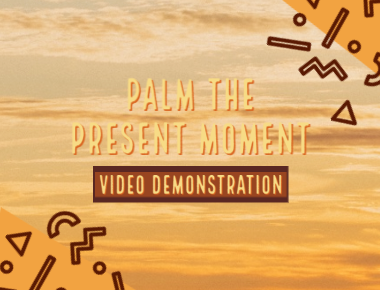Palm the Present Moment: A practical mindfulness tool

Anxious clients are often caught up in a myriad of thoughts spinning in their heads. For some, this rapid spinning of thoughts can even result in an overpowering sensation of nausea—almost like being on a boat that is bouncing up and down in choppy water. That makes sense when you consider that it has been estimated that the mind can generate up to 125 thoughts per second. Getting solidly rooted or grounded back in the body is one method for calming down, quieting the anxious or ruminating mind, and getting back onto more firm and peaceful ground.
In addition to anxiety, this practice is a good way of creating space from any negative emotions, anxious or ruminative thoughts, and feelings of being overwhelmed from stress or chaos. I also recommend this as a tool for when clients come into the counseling office and are not settled down due to the demands of time pressures, traffic congestion, getting a parking space, etc. Spending a minute or two getting grounded and centered at the start of a session can help the client enter a more receptive space.
One of the advantages of the Palm the Present Moment practice is that it's portable and easy to use. It offers a multi-purpose means of centering to counter anxiety—especially when transitioning from one physical location or situation to another. (This is also a useful one-minute mindfulness technique for therapists to use between sessions for the same reasons.)
Watch as I demonstrate the Palm the Present Moment. I hope you find it as useful and practical as I do.
Want more mindfulness techniques for your toolbox? Get instant access when you sign up for our FREE CE: One Minute Mindfulness featuring Donald Altman, M.A., LPC.
This blog is based on the writing of Donald Altman, M.A., LPC. You can read more in Donald's book, The Mindfulness Toolbox.
Donald Altman is a psychotherapist, award-winning writer, former Buddhist monk, teacher and adjunct faculty at Portland State University. He is also a faculty member of the Interpersonal Neurobiology program at Portland State University and teaches various classes blending mindfulness and Interpersonal Neurobiology.
In addition to anxiety, this practice is a good way of creating space from any negative emotions, anxious or ruminative thoughts, and feelings of being overwhelmed from stress or chaos. I also recommend this as a tool for when clients come into the counseling office and are not settled down due to the demands of time pressures, traffic congestion, getting a parking space, etc. Spending a minute or two getting grounded and centered at the start of a session can help the client enter a more receptive space.
One of the advantages of the Palm the Present Moment practice is that it's portable and easy to use. It offers a multi-purpose means of centering to counter anxiety—especially when transitioning from one physical location or situation to another. (This is also a useful one-minute mindfulness technique for therapists to use between sessions for the same reasons.)
Watch as I demonstrate the Palm the Present Moment. I hope you find it as useful and practical as I do.
Want more mindfulness techniques for your toolbox? Get instant access when you sign up for our FREE CE: One Minute Mindfulness featuring Donald Altman, M.A., LPC.
 |
This blog is based on the writing of Donald Altman, M.A., LPC. You can read more in Donald's book, The Mindfulness Toolbox.
Donald Altman is a psychotherapist, award-winning writer, former Buddhist monk, teacher and adjunct faculty at Portland State University. He is also a faculty member of the Interpersonal Neurobiology program at Portland State University and teaches various classes blending mindfulness and Interpersonal Neurobiology.





